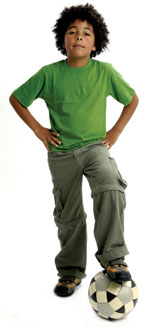
We know why tweens should move — our couch-potato nation is at risk for diabetes, heart disease and obesity — but sometimes it’s a challenge to introduce theory to practice so they play nicely. How to find the right activity? How to motivate a reluctant tween? How to find the time just to think about finding the time for yet another activity?
How to find the right set, match
The issue: You’re the 12th man. You’re always ready for a pickup touch football game, but your tween prefers to swim, solo.
The end run: Listen and learn.
I know a budding tween golfer in a family of skiers. How Jack came to love the links baffles his parents, but they were astute enough to recognize his interest and find a golf program for him. And because he can scratch his golf itch, Jack is happy to hit the slopes with his family.
By the tween years, many kids are accomplished at some form of physical activity. But tween land is all about differentiation, being with friends, and body changes, all of which can affect your tween’s interests.
Pediatrician Mel Levine, M.D., author of numerous books about child development and the brains behind All Kinds of Minds Institute, recommends that parents observe their children to discover who they are and what works for them. Making kids do things that they’re not suited for is a sure way to turn them off.
Once you’ve done some observing and you know what’s going to get your tween’s motor running, find a place to play. To find activities for tweens, start by checking out offerings at local community centers, Boys and Girls Clubs, the YMCA, pools and sports leagues.
Dr. Gabriel Berson, a pediatrician with Virginia Mason Nutrition and Fitness for Life (NFL) program, a childhood obesity intervention program, says that the social aspect of a physical activity will help sustain a child’s interest in it, so ask around; word of mouth is a great way to find activities — and friends to do them with.
‘I don’t feel like it’
The issue: You love to ski, bike, hike and swim, and your formerly outdoor-loving child has morphed into a resistant tween who is working on level 24 of Halo.
The end run: Make physical activity part of the fabric of your family.
Dr. Berson says that parental modeling is the single most important element to getting a tween to move — and keeping her moving. The NFL program philosophy is that physical activity must be a way of life, not just for the tweens who participate in the program, but for their parents, too.
“Parental modeling is powerful,” says Dr. Berson. “Kids might roll their eyes and say, ‘There goes Mom, running again,’ but having active parents sinks in; it makes active kids.”
Dr. Berson recommends families make physical activity part of family culture. He says that family activities such as after-dinner walks, cycling, a weekly swim, family dances or an intergenerational softball game at the annual family-reunion picnic can all be a source of family identity, which informs the way your tween self-identifies.
“Even if kids resist or think it’s hokey, if they have parents who engage in activities with them, it will have an impact, and they will remember it,” Berson says.
“All play is good play. If your tween wants to dance to the radio all afternoon, great.”
If it’s Tuesday, it must be a piano lesson
The issue: Your family’s calendar is so jammed with school activities, lessons and play dates, there’s barely room for meals; forget another activity.
The end run: Prioritize and plan.
Time management might be the biggest challenge for busy families who’d like to be more active but can’t imagine how to fit it in.
Laura Leist, CPO, author of Eliminate Chaos: the 10-step Process to Organize Your Home and Life, and the owner of Eliminate Chaos, a professional organizing company, says that not having enough time for exercise is a “life-management issue.” She says that “in order to have time to do something, first it has to be a priority.” If helping your tween move is important, make time for it.
“Most people with time-management challenges have no idea how they spend their time,” Leist says. “When I work with clients who want to manage their calendars, first I ask them to keep a time journal for a week, to track what they do every day.”
Keeping a time journal also helps Leist coach her clients to prioritize and learn how to say yes to activities that fit family priorities — and to say no to those that don’t. Once you’ve defined your family priorities, plan and document, to stay on track. Planning tools Leist recommends include the family-friendly online calendar www.cozi.com, and the Mom Agenda (www.momagenda.com).
And, if you think it’s impossible to manage an unwieldy family calendar, consider the slogan for Leist’s company: “More time for life.” Or, more time to help your tween get moving.
Christine Johnson-Duell is a poet and freelance writer. She lives in Ballard with her husband and daughter.
Resources
Activities:
All of the following offer a range of activities for kids and families.
Departments of Parks and Recreation:
- Seattle: www.seattle.gov/parks
- Tacoma: www.metroparkstacoma.org
- Shoreline: www.cityofshoreline.com/index.aspx?page=133
- Bellevue: www.ci.bellevue.wa.us/parks_homepage.htm
- Kirkland: www.ci.kirkland.wa.us/depart/parks.htm
- Mercer Island: www.ci.mercer-island.wa.us/SectionIndex.asp?SectionID=42
Boys & Girls Club: www.bgca.org
YMCA:
- Greater Seattle: www.seattleymca.org
- Tacoma: www.tacomaymca.org
North Cascades Institute Family Getaways: www.ncascades.org
Other Resources
All Kinds of Minds Institute: www.allkindsofminds.org
Virginia Mason Nutrition and Fitness for Life Program (Open to current Virginia Mason patients only): https://www.virginiamason.org/home/body.cfm?id=156&action=detail&ref=88
Eliminate Chaos: www.eliminatechaos.com
Family Calendars:
Online: www.cozi.com
On paper: Mom agenda is available at The Container Store or at www.momagenda.com.









